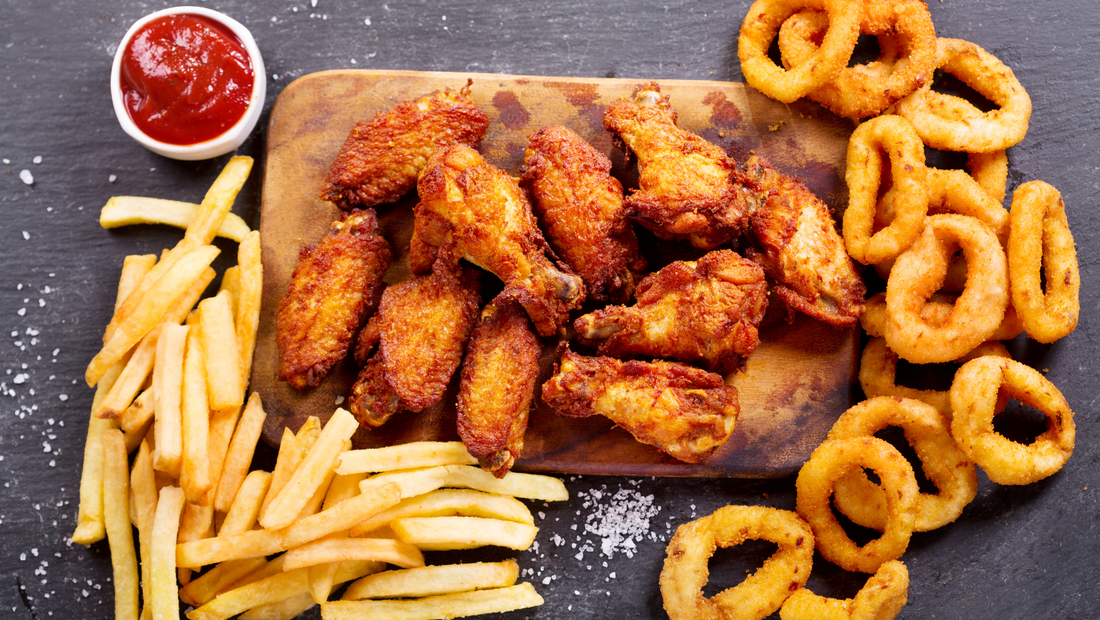10 Foods To Avoid If You Have Acne

Acne – the relentless foe that haunts the faces of teens and adults alike. It's a tale as old as time, but did you know that what you eat can play a role in this skincare saga? In this comprehensive guide, we'll delve into the nitty-gritty of acne-triggering foods and spill the beans on a skincare routine that could be your secret weapon. Get ready to bid farewell to those pesky breakouts!
The Culprits:
🥛Dairy
Let's kick things off with the dairy dilemma. Milk, with all its creamy goodness, has been pointed out as a potential culprit behind increased acne severity. The hormones and growth factors found in milk might be the troublemakers, sending oil production into overdrive and clogging up those precious pores. If you're looking for an alternative, almond or soy milk might just be your new BFFs.
🍭Sugar
Ah, sugar – the sweet nemesis of clear skin. High-glycemic foods, such as refined carbohydrates and sugary treats, can send your blood sugar levels on a rollercoaster ride. The aftermath? Increased insulin production, inflammation, and excess oil production – the perfect recipe for a breakout bonanza. Time to bid farewell to the sugar rush and opt for a more stable diet.

Processed Foods
Processed foods – the masked villains in our dietary story. Packed with refined sugars, unhealthy fats, and a medley of artificial additives, these troublemakers disrupt your body's natural balance, leading to skin havoc. Say no to the processed mayhem and choose whole, unprocessed foods to give your skin the love it deserves.
🍟Fried Foods
Who doesn't love the occasional fried delight? Unfortunately, your skin isn't a fan. Indulging in a diet high in fried and greasy foods can lead to acne woes. The excess oil and grease have a knack for clogging up pores and aggravating existing breakouts. It's time to give your skin a break from the fryer.

🍫Chocolate
Chocolate, the age-old temptation, has long been debated in the acne arena. Some studies suggest that high levels of sugar and dairy in certain chocolate products might contribute to breakouts. The solution? Opt for the darker side of chocolate – varieties with higher cocoa content – and savour in moderation.
🧂Salt
While salt itself might not be a direct acne instigator, excessive intake of iodised salt can rev up inflammation. Trade it for sea salt or Himalayan salt to keep your skin's drama in check.
🦐Shellfish
Shellfish, particularly shrimp and lobster, boast high levels of iodine, potentially worsening acne symptoms. If you suspect iodine might be the trigger for your acne, consider dialling down your shellfish intake.
☕Caffeine
Caffeine, the daily saviour for many, can turn into a foe when consumed in excess. Too much caffeine can lead to dehydration and stress, impacting your skin health. Keep your coffee dates chill and stay hydrated to keep your skin happy.
🌶️Spicy Shenanigans
Spices, the life of the culinary party, might also be the culprit behind your acne struggles. Excessive sweating induced by spices can contribute to clogged pores and acne. If you're a spice enthusiast, indulge in moderation and pamper your skin with proper care.
What Foods Are Good For Acne
Now that we've identified the antagonists, let's talk about the heroes – the foods that could be your allies in the fight against acne.

In the quest for clearer skin, adopting a skin-friendly diet is as crucial as avoiding acne-triggering foods. Incorporating nutrient-rich, anti-inflammatory foods into your daily meals can contribute to improved skin health. Opt for a diet rich in fruits and vegetables, as they are packed with vitamins, antioxidants, and fibre that promote skin rejuvenation and reduce inflammation.
Foods high in omega-3 fatty acids, such as fatty fish (salmon, mackerel, and sardines), flaxseeds, and walnuts, can help manage inflammation and support overall skin wellness. Whole grains like brown rice and quinoa provide complex carbohydrates that have a lower impact on blood sugar levels compared to refined grains.
Additionally, consider including probiotic-rich foods like yogurt, kefir, and fermented vegetables to promote a healthy gut microbiome, which has been linked to skin health. Staying well-hydrated with water and herbal teas is also essential for flushing out toxins and maintaining skin elasticity. Ultimately, a balanced and varied diet that focuses on whole, unprocessed foods can play a significant role in achieving and maintaining clear and radiant skin.
🧴Skincare Matters Too
Moreover, while dietary choices undoubtedly influence skin health, it's equally essential to pay attention to what you put on your skin. Skincare routines tailored to your skin type can complement your dietary efforts. For the best skincare routine, consider exploring products from FatCowSkin, our brand-name dedicated to enhancing your skin’s natural beauty with high-quality ingredients.

Opt for gentle, non-comedogenic cleansers to remove impurities without clogging pores, and consider exploring natural options. Tallow, derived from animal fats, is rich in nutrients and can be a nourishing addition to your skincare routine. Its moisturising properties can help balance oil production without causing breakouts, making it a unique and effective choice for some individuals.
Sunscreen is a non-negotiable element in any skincare regimen, shielding your skin from harmful UV rays that can worsen acne scars and inflammation.
Striking a balance between proper skincare practices and a skin-friendly diet is a holistic approach to achieving and maintaining clear, radiant skin. Remember, what you apply topically can complement the positive effects of a nutritious diet, contributing to a comprehensive strategy for healthier skin. FatCowSkin's grass fed tallow balm and tallow cream for head to toe are excellent additions to your skincare regimen, offering natural nourishment and protection for your skin.
Achieving clear and healthy skin involves a multifaceted approach, and diet is undoubtedly a significant factor. While these foods may exacerbate acne for some individuals, it's essential to remember that everyone's body is unique. Pay attention to how your skin reacts to different foods, and consider consulting with a dermatologist or healthcare professional for personalised advice on managing acne.
Making informed dietary choices, along with a consistent skincare routine, can contribute to a clearer complexion and improved overall well-being. Incorporating products like tallow charcoal cleansing soap into your skincare regimen can significantly enhance its effectiveness, helping to detoxify and clarify your skin naturally. Remember, it's a journey, not a destination. Embrace the good stuff, listen to your skin, and let the clear-skin vibes roll!✌️✨





